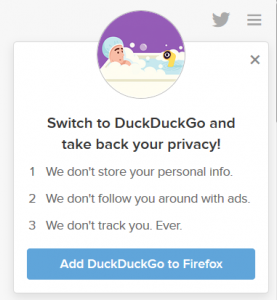When we first started using Google, who would have thought that we’d want Private Search Engines in 2018? Privacy on the internet is something we used to take for granted. No one knew that we were logging into weird sites or making questionable purchases. That’s all changed now. Google tracks us. Facebook tracks us. Even Amazon knows that we bought those pink Ugg boots at Marshalls.
Last year I learned about a search engine that doesn’t track our searches. I have installed it on my phone, my tablet, and my laptop. It was easy to do. While my level of trust with technology is somewhat lower than it was five years ago, I do feel good about using DuckDuckGo.
But as I started researching this article, I wondered what other search engines are out there. It turns out that there are several from which to choose.
PRIVATE SEARCH ENGINES:
DuckDuckGo
DuckDuckGo is the one of the first private search engines I became aware of. I found that the app was easy to install on all of my devices. I like their privacy policy which is described on their website:
“DuckDuckGo does not collect or share personal information. That is our privacy policy in a nutshell.”
However, SearchEncrypt doesn’t think DuckDuckGo is as secure as it could be. Here’s a description of its major flaw on the SearchEncrypt website:
“DuckDuckGo is a private search engine. It is adamant about spreading privacy around the internet. However, there is one issue we discovered that raises privacy concerns. Your search terms, while they may be sent over your network in an encrypted form, show up in plain text in browsing history. DDG may work well for reducing advertiser tracking, avoiding filter bubbles, and limiting data profiling, however as this post explains, it may not offer the protection from surveillance organizations that some think.”
StartPage:
StartPage was originally developed in New York as the Ixquick private search engine. It was then acquired by a Dutch company and so most of its growth was in Europe. Now, they are becoming more well known around the world, including the US. They do utilize Google to get their results. I like how they define “Personal Information”
“Information is regarded as personal when it tells something about a human being who is or can be (uniquely) identified.
This definition stems from European law, which applies to StartPage, and is intentionally broad in order to provide a high level of privacy protection. This means, for example, that not just names and e-mail addresses can be personal information, but also numbers or other identifiers, such as your IP-address, to the extent that they link other information to a specific human being.”
SearchEncrypt:
According to HackerNoon, this is a newer edition to the private search engines. But SearchEncrypt is gaining users. Here is HackerNoon‘s description:
“This private search engine uses local encryption to secure your searches. It combines with AES-256 encryption with Secure Sockets Layer encryption. Search Encrypt then retrieves your search results from its network of search partners. After you’re done searching, your search terms expire so they are private even if someone else has access to your computer. Search Encrypt is a relatively new addition to this list, but it is growing quickly. Its Alexa Traffic Rank of 878 indicates that it receives millions of visitors daily.”
More About Private Search Engines:
If you’re looking for other private Search Engines, you can find a few listed in this article.
How do you do your Internet searches? Are you using Google, Yahoo!, or something else?
Chris Eddy of Geek For Hire, Inc. has been providing computer service to families and small businesses with Mac’s and PCs for the past fifteen years. His company is highly rated by both the BBB (Better Business Bureau) and by Angie’s List. You can find more on our website, or give us a call on 303-618-0154. Geek For Hire, Inc. provides onsite service (Tier 3) to the Denver / Boulder / Front Range area as well as remote service throughout North America.
We’ve been using Amazon Prime for the past few years. We like the free 2-3 day shipping and the online streaming. I haven’t tried the Kindle lending library yet. I’ll try that next! Prime is normally $99/year, but you can try it for 30 days for free by clicking on this link: Try Amazon Prime 30-Day Free Trial
(Any links to products or services in this post may be affiliate links. If they are, we may receive a small commission when you click on it. Rest assured, your price will be the same!)
